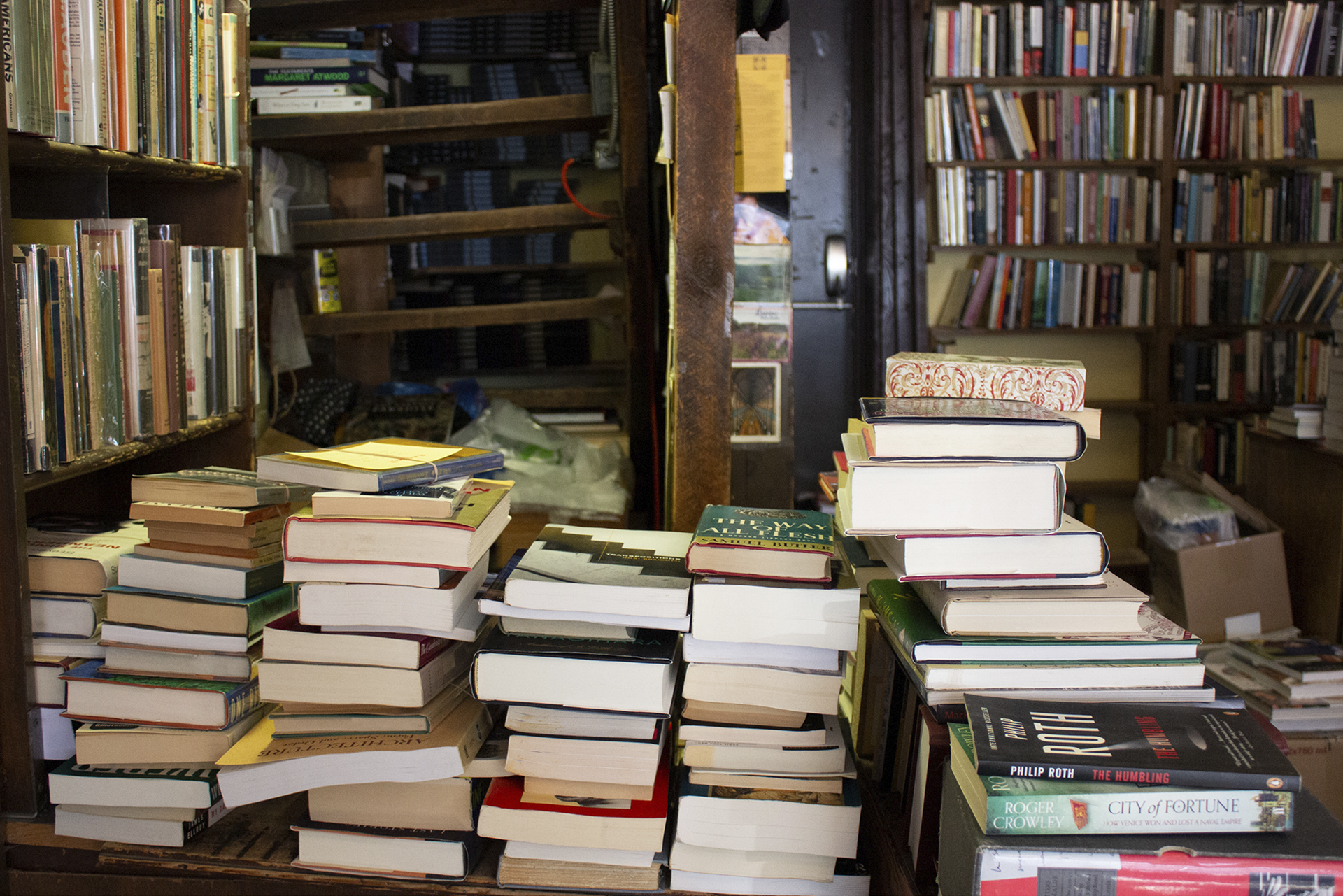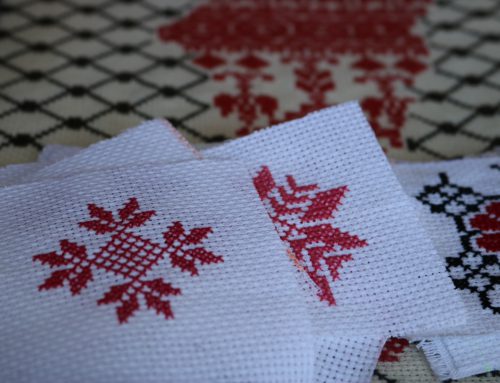BY Aysha White & Olivia Piché
“I think that publishing your first book is difficult and nerve-wracking to begin with, and to do that during a heightened part of the pandemic was extra tough,” explains Montreal writer Helen Chau Bradley.
Bradley is the author of Personal Attention Roleplay, a collection of short stories published by Metonymy Press, based in Montreal.
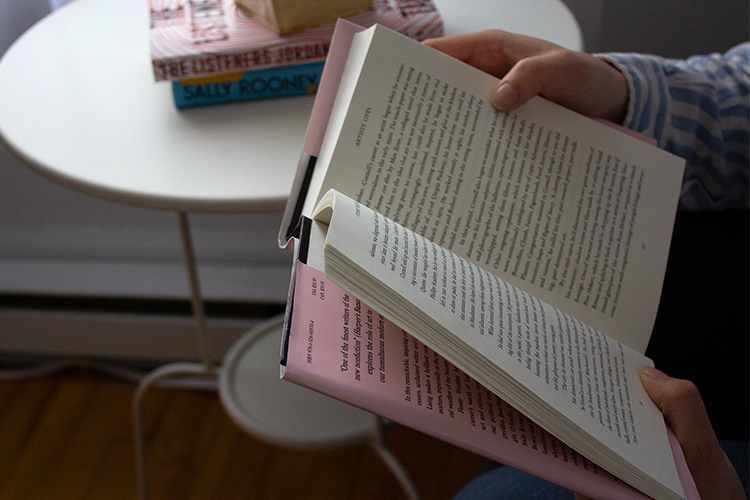
A woman opens a book to read. Photo by Olivia Piché.
Metonymy is an independent press that focuses on emerging writers and is social-justice oriented.
“It was hard,” Bradley notes, speaking about the experience of having their debut collection published during the pandemic. “There were major supply chain issues [which] delayed the book’s publication for more than a month because there was no paper at the printers that my publisher uses. It ended up being fine, but it was all very stressful.”
Bradley used to be a musician, so touring and engaging with a live audience is familiar and fun for them.
Due to the pandemic, it wasn’t possible to do a book tour in Canadian cities to promote Personal Attention Roleplay, as would normally have happened.
“It felt very disappointing. I don’t want to knock online events though. I think it’s really great we can do events that far more people are able to access,” says Bradley.
Publishing with a small imprint rather than a larger corporate one comes with advantages, like the feeling that their work is being treated with personalised care.
A 2020 Statistics Canada report stated that reading was a popular activity during the pandemic. However, the trend didn’t translate to sales for the book publishing industry, which saw its revenues decrease by 5.5 per cent.
When it came to wages, the Quebec book industry took the biggest hit in the country, at 22 per cent.
The zine community in Montreal isn’t often included in official statistics. But since 1998, Arcmtl has been helping to preserve Montreal’s independent arts.
“The organisation was set up with a mandate to promote the independent arts, people who do it themselves,” says Louis Rastelli, the director of Arcmtl.
He has been active in the indie arts and publishing scene since the 1980s. He says the pandemic did change publishing, but no more than other events like the rise of the internet and the increase in postage costs due to 9/11.
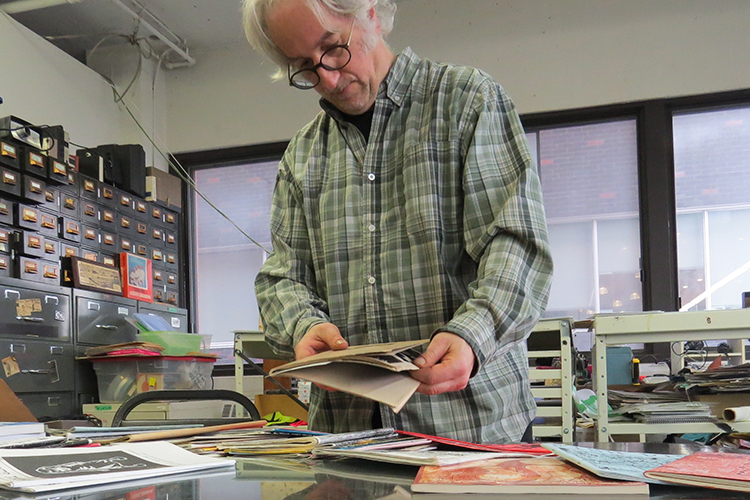
Louis Rastelli, the director of Arc Mtl with a zine he published, “Fish Piss.” Photo by Aysha White.
Arcmtl is a unique non-profit arts organisation that archives pop culture items such as zines, independent publications, music and posters. It also hosts cultural events such as Volume MTL, GRANDE Print Art Fair and Expozine.
Expozine is one of the most well-known fairs of its kind in North America.
“The pandemic was one thing but coming out of the pandemic with the massive changes to the scene, it’s going to be a tricky year. Surviving the pandemic was the first goal of all the festivals, and organisations, and venues. We definitely lost a lot of those locations where people would host events,” explains Rastelli.
He says that the last live event Arcmtl hosted before the first lockdown was a series of readings at La Vitrola on Saint-Laurent Blvd. It closed not long after the pandemic started.
Arcmtl is also responsible for the quirky-cool Distroboto Project, launched in 2001, in which old cigarette vending machines were converted to dispense fun-sized zines and other works of art.
Rastelli explains that the pandemic has magnified issues such as gentrification in neighbourhoods like the Plateau where there were once many Distroboto vending machines.
Rents that keep increasing have pushed out many of the businesses that once housed the former cigarette machines. Now only three are left in the Plateau-Mont-Royal borough.
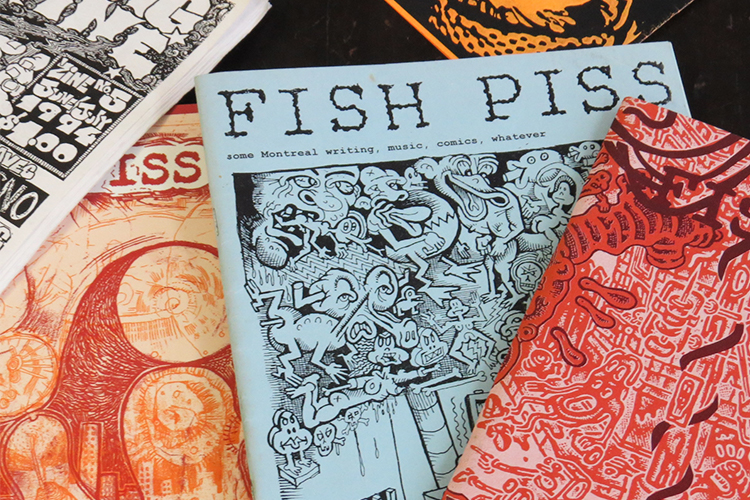
Closeup of the zines, including Fish Piss by Louis Rastelli. Photo by Aysha White.
Rastelli explains that there were unexpected benefits to the increased digitization that the pandemic necessitated, like recording and digitizing some of their events.
Chloe Lum is one of the organisers of Volume 4 MTL. It’s the largest and only bilingual art book fair in North America. Its fourth edition, held in the fall of 2021 was a hybrid in-person and online event.
Lum says the amount of sales made at Volume 4 MTL were noticeable and there was a strong sense of wanting to show support from the community who came to the fair.
Lum is currently working on the upcoming Festival des arts imprimer, another Montreal indie publishing event. “Coming from printmaking and DIY, also being an artist, I’ve been able to use my experience and contacts to work across the different festivals,” she explains.
Having tabled at similar fairs to Volume, including the early years of Expozine, Lum mentions that she found the experience as an organiser more stressful due to the increased responsibility of the role. Events were recorded, necessitating soundchecks, for example.
The magazine industry is another aspect of the independent publishing world impacted by the COVID-19 pandemic. A 2020 Statistics Canada report pointed to a fiscal decline in the arts and culture sector, including book, and magazine publishing.
Periodical publishers experienced the most severe losses, seeing their operating revenues decrease by approximately 23 per cent.
Yiara Magazine is a Montreal-based, student-run magazine focusing on art through a feminist lens.
Creative Director Nesreen Galal describes planning an issue online as a “challenge.” But it also has its benefits.
“It is also more convenient for the team to have it done online, as not everyone lives in the same area in Montreal,” she explains.
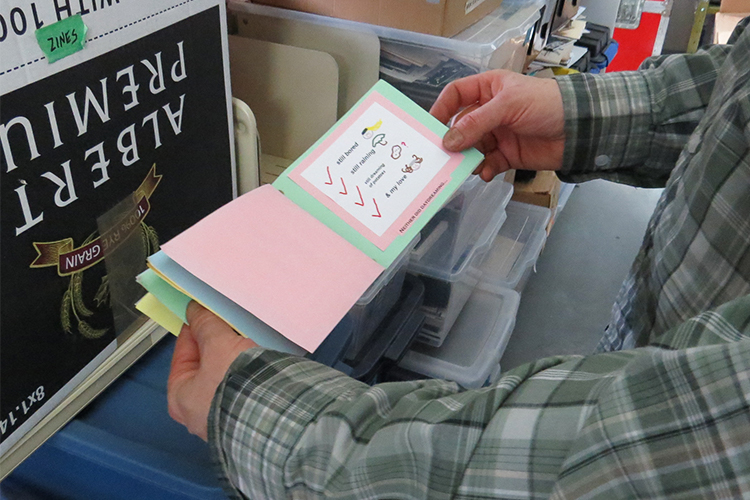
Louis Rastelli opens a miniature zine archived in the Arcmtl office. Photo by Aysha White.
Despite the physical disconnection the writing community in Quebec has continued to communicate in novel ways. In an email, Afreina Noor, the communications officer for the Quebec Writers Federation, explains that they organised a project over the pandemic, inviting writers to chronicle their experiences of the time.
It eventually became a book, Chronicling the Days: Dispatches from a Pandemic, which focused on the everyday experiences of 100 writers using the prompt, “What’s the story of your day?”
Quebec bookstores saw a surge in business during the COVID-19 pandemic. Video by Olivia Piché.
There was a lot of support for the independent publishing community throughout the pandemic. Rastelli mentions that independent bookstores were flooded with customers after the initial reopening in 2020.
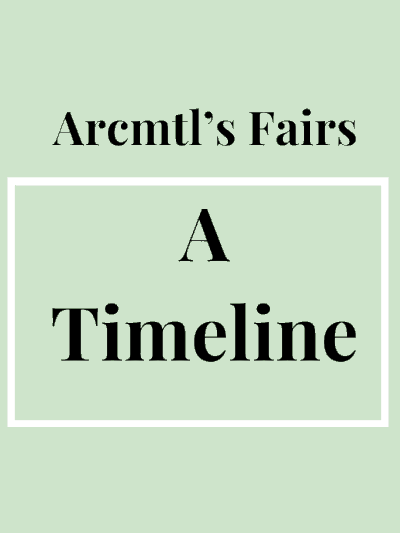
A timeline of Arcmtl’s fairs. Animation by Aysha White.
Rastelli also says the pandemic created a little nostalgia.
“The origins of the zine world, from what I remember in the mid 80’s, is that it was all by the mail,” he says. “Have you heard of Quaranzines?”
Quaranzines is the Instagram hashtag used by creators throughout the pandemic to draw attention to works made during the lockdowns. Since the initial hashtag there have been multiple personal or collective zines, both print and digital, released under the name.
“The pandemic really kickstarted a lot more of what used to be the old zine scene, says Rastelli. “People trading zines through the mail, people doing callouts for collective zines, mail art. The quarantine and the lack of things to do actually made people rediscover those kinds of zine making and zine networks. Lest we forget the Internet never replaced zines.”
